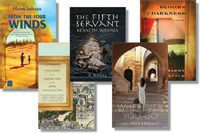By Diana Brement, JTNews Columnist
Though modern Israel is not a direct result of the Holocaust, despite new generations that have grown up or emigrated there, its legacy still weighs heavily on the country’s authors. Still struggling to come to terms with the magnitude of that genocide, they claim it in their own words, sharing memory and vision before the survivors are gone.
Recent books from two of Israel’s most popular novelists tackle the Holocaust from a child’s perspective, one during, and one after the war.
Aharon Appelfeld’s latest novel published in translation is Blooms of Darkness, (Schocken, cloth, $25.95). Now 78, Appelfeld has made Holocaust remembrance the focus of his prolific career.
While he often uses allegory (as in his last novel, Laish), here he tells a more realistic tale through the eyes and words of a child. Hugo — sheltered and somewhat immature — has just turned 11 in the ghetto when his mother tells him he is to go into hiding. He spends the rest of the war in the closet of his mother’s childhood friend, a gentile Ukrainian prostitute, a woman whose love as much as anything allows Hugo to survive the end of the war. Appelfeld manages to capture the child’s confusion and naiveté by sticking rigorously to Hugo’s sad and confused perspective.
Another beloved Israeli novelist, Haim Sabato, picks up the post-Holocaust narrative in Israel in the early 1950s. The Mizrachi rabbi uses his childhood memories as the basis of a thinly veiled fictional account of his first years as a refugee in Israel in From the Four Winds (Toby, cloth, $24.95).
Sabato’s family came from Egypt and our young (2nd grade) narrator is finding his new home quite confusing. His mother is busy with her younger children and his father works day and night, so no one is available to explain this odd custom of wearing costumes for Purim.
“And why would they dress up on Purim as a cowboy or an Indian? And what was a cowboy anyway?… I ruminated on the Hebrew word “cowboy” and tried to think of its origins. Of course I didn’t dare ask.”
But through his childish puzzling about the new world into which he’s been thrust, young Haim becomes aware of the experiences and the suffering of his European neighbors during the war, compounding their poignancy through his youthful and innocent observations.
Sabato also paints a wonderfully vivid picture of life in a resettlement neighborhood in 1959, with its varieties of immigrants and their attempts to get along.
The Holocaust is at the center of an excellent debut novel, Sara Houghteling’s Pictures at an Exhibition (Vintage, paper, $15), but this story focuses on Paris before and after the war and the tragedy of a different kind of annihilation — the looting and destruction of France’s most valuable art by the Nazis.
Max Berenzon is the son of one of Paris’ most successful art dealers. His father guides him to medical school, insisting he lacks the instinct for the family business. After the war he and his father return to Paris from their hiding place in the country to find their gallery and home looted and occupied. Anxious to prove his worth, Max goes to the brink of madness trying to locate the things most important to him: The family paintings, his best friend, and his paramour, who becomes the key to the mystery of the artworks’ fate.
Houghteling based her book on extensive research and interviews. It’s through her we feel the pain of the loss of these great works of art, few of which have been recovered.
Modern Israel is the location of American Joan Leegant’s captivating first novel Wherever You Go (Norton, cloth, $23.95). Intriguing and well crafted, Leegant tells the stories of three very different Americans in Israel for equally different reasons: A young woman trying to connect with her estranged sister who lives in a religious settlement; a young man with a famous father trying to carve out a radical identity for himself; and a scholar, a baal teshuva, struggling to find his place in the Orthodox community in which he teaches. Their lives collide dramatically as Leegant subtly demonstrates the destructive nature of religious extremism and the political and religious contradictions in that country.
Finally, a little off topic — although one could argue a link between Medieval Europe, the Holocaust and Israel — comes a clever novel from Kenneth Wishnia, The Fifth Servant (Morrow, cloth, $24.99). Wishnia combines an intricate historical novel with a classic murder mystery, all while demonstrating excellent knowledge of Jewish texts. The setting is Prague in 1592 and Benjamin has arrived in the city to work as a shammes for the famous Rabbi Lowe — or is that shamus? Almost as soon as he arrives, a young gentile girl is murdered, Jews are accused, and clever Benjamin must save the Jews from Christian wrath. It’s a complicated plot, but an entertaining offer that meets lots of interests.
